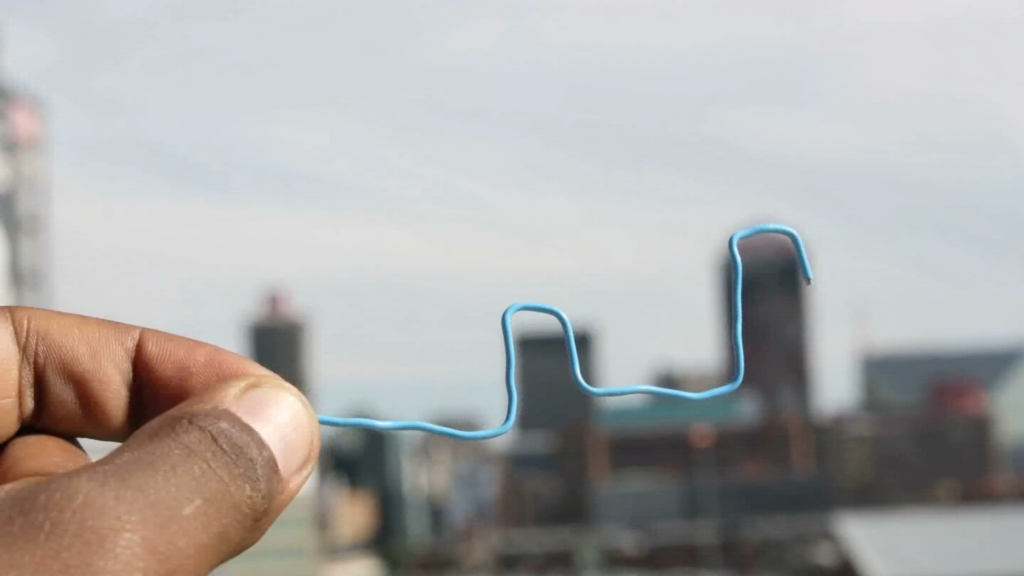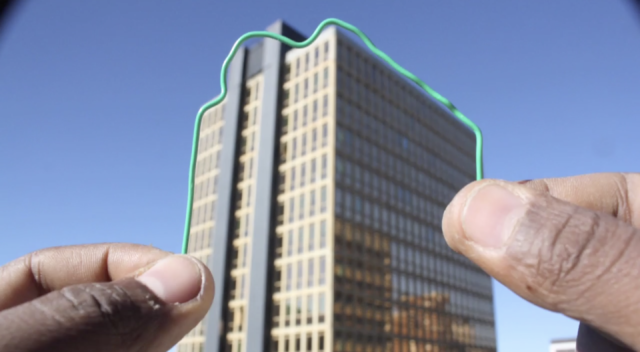Ezra Wube
Mela, 2011
Stop motion animation using paper clips, 1:41
On loan from the Artist
On view in the E. Craig Wall, Jr. Academic Center from August 16 – October 3, 2020.
Please note: All buildings on campus, including the Wall Center, are only open to Davidson students, faculty, and staff due to the pandemic. We are planning to re-screen videos at a later date when the campus opens to the community! Sign up for our mailing list to stay in the loop.
Ezra Wube (b. 1980, Ethiopia) is an artist working in animation, painting, installation, and video. He immigrated to the United States from Ethiopia when he was eighteen, and received a BFA in painting from the Massachusetts College of Art in Boston and an MFA from Hunter College in New York. Wube is currently based in Brooklyn, NY.
Wube’s stop-motion animation, Mela (2011), is on view in the E. Craig Wall, Jr. Academic Center until October 3, 2020 alongside three other digital artworks on the theme of migration, displacement, and belonging. In Mela, the artist’s hands guide an unfurled paperclip across the Johannesburg skyline. The paperclip changes from green to yellow, red, black, and white (the full spectrum of the South African flag) as it scoots over blurry buildings in a full 360° panorama.

“In this piece I am exploring the idea of belonging by tracing the outline of the shifting skyline. Through imagination, learning, and a continuous adjustment, I strive to relate the communal with the personal identity.”
http://ezrawube.net/mela.htm
Q&A with artist Ezra Wube and Gallery and Collections Coordinator Elizabeth Harry ’14:
Q: Will you explore the idea of belonging? What does it mean to you, and how do you think it manifests in this video?
A: For me belonging is a way to feel familiar to a situation, or to have something in common. It is to take something from your past and combine it with your present. Especially as an immigrant, you’re always in an existential crisis, like “what’s your true self? Is this who you are? What is your relationship to the place?” Up until the point I made this work, almost all my work was about finding a way to bring my past and relate it to my present experience. But, in this piece I let go of the past more fully. As an immigrant, you can adapt and fit yourself into a place.
Q: What sparked the idea for this artwork?
A: I was interested in breaking down the idea of nationality: anyone could be anything, anywhere. Anybody can be from any place. When I started this project in Troy, NY I was doing skyline tracing, but I also inserted paper cutouts. In Johannesburg, I decided to remove the cut-outs and just do skyline tracing. I thought I might keep making these videos whenever I travel to a new place. I was going to change the paperclip colors depending on where I was. The idea of using paper clips is: immigrants are already filling out so much paperwork, and the paperclip is a common part of that process, to bind all that together.
Q: In your artist statement, you discuss an interest in the tension between seemingly opposite concepts like here and there, past and present, near and far. I think Mela visualizes those types of dependent dichotomies nicely– relationship between foreground and background, for example. The tracing in the foreground depends on the shape of the skyline, and the selective focus on your hands calls attention to that tension. I’m curious what interests you about these kinds of relationships?
A: In Mela you definitely have the “set scene” of the background, and then my personal interpretation of the background fitting in to the scene. There is communication between the private and the communal. You can never quite catch up with a place as it changes. Especially as an immigrant, you are rootless. Like, every time I write in English I have trouble with prepositions because I haven’t had the basic training, but at the same time I have a college degree. But also, my Amharic isn’t really advanced. So there’s a fragmentation; you haven’t developed your past, but you also haven’t fully rooted into the new place. So, I think it’s important to relate to the communal, it’s a longing to relate to the place where I am. Also, as an immigrant you don’t need to always carry on the burden of representing a culture. It is possible to be responsive, embrace and transform.
Q: Does the title have any particular meaning?
A: It’s the second video I made after a song. It’s based on an Amharic song about a guy who lost his lover and is singing about how to find her, and he’s lost. “Mela” means a way or means.
Q: And final advice for Davidson students during the pandemic?
A: It’s a very difficult time. You can think of it as a way of pausing other routines and think about your values in life. Maybe it’s a chance for a change. Like, environmentally you can see clearer skies and stars.
As a student, I was always worried about making my masterpiece. Don’t worry about making your masterpiece. Just work on opening up your mind as much as possible. Build a good community, which you are going to need throughout your career. Expose yourself to ideas as much as possible and use all the resources available to you. It’s a time and a place to explore and experiment. Don’t worry about making a masterpiece.
About the Artist:
Ezra Wube has exhibited internationally at venues such as the Gwangju Biennale, South Korea and The Studio Museum in Harlem, NY. He has also completed several residencies, such as Pioneer Works, Brooklyn, NY; Open Sessions Program, The Drawing Center, NY; and The Substation Artist Residency Program, University of Witwatersrand, Johannesburg, South Africa. He also organizes the annual Addis Video Art Festival, a platform for innovative international video art in Addis Ababa, Ethiopia.
View this video interview with Ezra, produced by Pioneer Works in Brooklyn, NY, to see more of his artwork:

